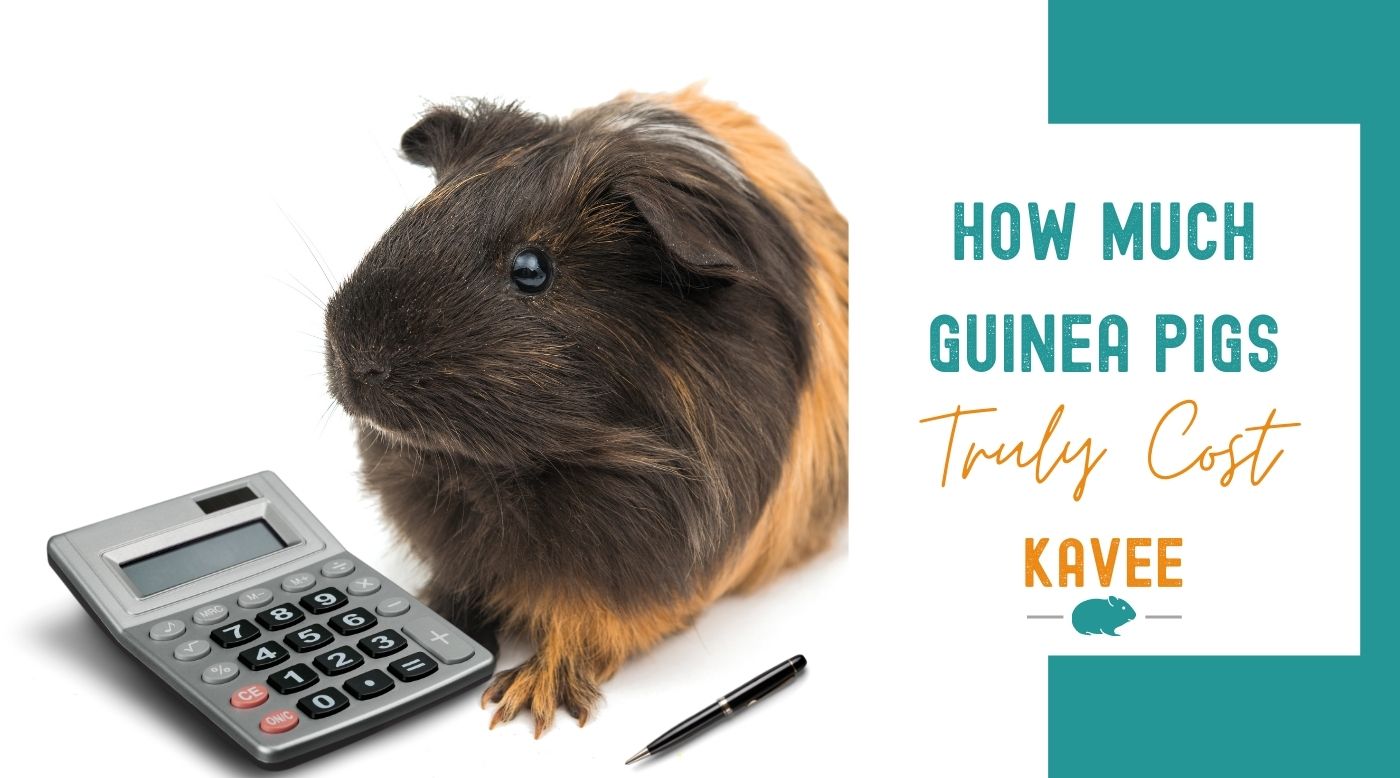Are Guinea Pigs Expensive To Take Care: True Cost Revealed!
Are you thinking about getting a guinea pig but worried about the costs? It’s natural to wonder, “Are guinea pigs expensive to take care of?” You want to make sure you can provide a happy, healthy home without breaking the bank.
You’ll discover the real expenses involved—from food and bedding to vet visits and toys. By the end, you’ll know exactly what to expect and how to plan your budget wisely. Keep reading to find out if a guinea pig fits your lifestyle and wallet.

Credit: kavee.com
Initial Costs
Starting to care for a guinea pig comes with some initial costs. These costs cover the pet itself and the things needed to keep it happy and healthy. Knowing these expenses helps prepare for the new pet without surprises. Understanding initial costs is important for responsible pet care.
Buying A Guinea Pig
Buying a guinea pig usually costs between $20 and $40. Prices vary by breed and where you buy it. Some shelters or rescues may charge less or only ask for a donation. Avoid buying from places that seem careless about animal care. A healthy guinea pig is a good start for a happy pet.
Essential Supplies
Essential supplies include a cage, bedding, food, and water bottles. The cage is the biggest initial cost, often costing $50 or more. Bedding, like hay or paper-based products, costs about $10 to $15. Food and water supplies usually cost around $10. Other items like toys and hiding places add to the setup. These supplies create a safe and comfortable home for the guinea pig.
Housing Expenses
Housing expenses are a key part of caring for guinea pigs. A safe and comfortable home keeps them happy and healthy. It also affects how much you spend regularly. Understanding the costs helps plan your budget better.
Choosing the right cage and bedding is important. Both items vary in price and quality. Spending wisely saves money and ensures good care for your pet.
Cage Options
Cages come in many sizes and materials. Plastic cages are cheaper but less durable. Metal cages cost more but last longer. Bigger cages give guinea pigs more space to move.
Simple cages start around $30. Larger, high-quality cages can cost $100 or more. Some cages include extra features like ramps or hideouts. These add to the price but improve comfort.
Bedding Materials
Bedding keeps the cage clean and dry. It also provides softness for guinea pigs to rest. Common types include paper, wood shavings, and fleece.
Paper bedding is safe and easy to clean. Wood shavings are affordable but some types can irritate pets. Fleece is reusable and more expensive upfront but saves money over time.
Expect to spend $5 to $20 monthly on bedding. Choosing good quality bedding protects your pet’s health. It reduces the need for frequent cleaning and replacements.
Food And Treats
Taking care of a guinea pig means feeding it properly every day. Their food and treats play a big role in their health. Knowing what to give helps keep costs clear and manageable. It also ensures your pet stays happy and healthy.
Daily Diet Needs
Guinea pigs need fresh hay all day long. Timothy hay is a popular choice. It helps with digestion and keeps teeth healthy. Fresh vegetables are also important. Leafy greens like romaine lettuce and cilantro are good options. Avoid giving too much fruit, as it has sugar. Guinea pigs must have vitamin C daily. Special pellets made for guinea pigs provide it. These pellets are affordable and easy to find. Make sure water is always available and clean.
Special Treats
Treats are great for bonding and training. Small amounts of fruits like apple slices or strawberries work well. Offer treats only once or twice a week. Too many treats can cause health problems. Avoid sugary or processed snacks. Natural treats like small pieces of carrot or bell pepper are best. Treat costs add up slowly but do not make care expensive.

Credit: www.omlet.co.uk
Health And Vet Care
Taking care of a guinea pig’s health requires attention and some costs. Healthy pets live longer and are happier. Knowing about health and vet care helps you plan your budget well. Regular care prevents many health problems and keeps your guinea pig active.
Routine Checkups
Routine checkups are important for guinea pigs. A vet visit every 6 to 12 months is ideal. These visits catch small problems before they become serious. The vet checks teeth, eyes, skin, and weight. Routine visits usually cost less than emergency care.
Common Health Issues
Guinea pigs can suffer from several common health problems. Respiratory infections are frequent and need quick treatment. Dental issues occur because their teeth grow continuously. Skin parasites or fungal infections can cause discomfort. Recognizing symptoms early lowers treatment costs and stress for your pet.
Emergency Costs
Emergencies can happen even with good care. Sudden illness or injury needs immediate vet attention. Emergency visits are more expensive than regular checkups. Costs may include medicines, tests, or surgery. Keeping an emergency fund ready helps manage these unexpected expenses.
Grooming And Maintenance
Grooming and maintenance are important parts of caring for a guinea pig. These small pets need regular attention to stay healthy and happy. Proper grooming helps prevent health problems and keeps your guinea pig comfortable. It also strengthens the bond between you and your pet.
Nail Trimming
Guinea pigs have fast-growing nails that need regular trimming. Long nails can hurt their feet and cause pain. Trim nails every few weeks to keep them short and smooth. Use small nail clippers made for pets. Be careful not to cut too close to the quick, which is the sensitive part inside the nail. If unsure, ask a vet or pet expert for help.
Coat Care
Guinea pigs have soft fur that needs gentle care. Brush their coat at least once a week to remove dirt and loose hair. Long-haired guinea pigs require more frequent brushing. This helps stop mats and tangles from forming. Bathing is rarely needed and can stress your pet. Use a damp cloth to clean dirty spots instead. Regular grooming keeps their coat shiny and skin healthy.
Time And Attention
Guinea pigs need time and attention every day. They are social animals that thrive on interaction. Caring for them means more than just feeding and cleaning. You must spend quality time to keep them happy and healthy.
Social Needs
Guinea pigs enjoy company. They often live better with another guinea pig. Without friends, they can feel lonely and stressed. Daily interaction with humans is also important. Talking, petting, or gently holding them helps build trust. Lack of attention can lead to sadness and health problems.
Exercise And Enrichment
Exercise keeps guinea pigs strong and active. They need space to run and explore each day. Toys and tunnels add fun and mental stimulation. Bored guinea pigs can become lazy or grumpy. Providing new objects or rearranging their cage sparks curiosity. This keeps their mind sharp and body healthy.
Hidden And Unexpected Costs
Owning a guinea pig involves more costs than just food and a cage. Some expenses hide in small details. These can surprise new pet owners. Understanding these costs helps plan a better budget. This way, you can give your pet a happy and healthy life.
Replacement Supplies
Guinea pigs need many supplies that wear out fast. Bedding must change often to keep their space clean. Chew toys break or get dirty and need replacing. Water bottles and food bowls can leak or crack. These items add up over time. Buying cheap supplies may cost more in the long run. Quality products last longer and keep your pet safe.
Travel And Boarding
Traveling with a guinea pig needs extra care and gear. You may need a special carrier for safety and comfort. Boarding your pet during trips costs money too. Not all places accept guinea pigs, so finding care can be tough. Boarding fees vary but can be quite high. Planning ahead saves stress and unexpected spending. Your pet’s comfort and safety are important during travel.
Cost Comparison
Comparing the cost of caring for guinea pigs with other pets helps you plan better. It shows which pet fits your budget and lifestyle. Understanding these costs avoids surprises and helps keep your pet happy and healthy.
Guinea Pigs Vs Other Pets
Guinea pigs usually cost less than dogs or cats. Their food and bedding are cheaper. Vet visits often cost less, too. They need less space, so housing costs are lower. Fish and hamsters might be cheaper, but guinea pigs live longer. Birds can be more expensive because of special cages and food. Guinea pigs strike a good balance between cost and companionship.
Budgeting Tips
Start with a clear budget for your guinea pig. Buy supplies in bulk to save money. Look for deals on food and bedding. Regular cleaning reduces vet bills by keeping pets healthy. Set aside money for unexpected health costs. Choose simple toys and accessories instead of costly ones. Planning helps you care for your pet without stress.

Credit: kavee.com
How Smart Pets Lover Can Help You with Are Guinea Pigs Expensive To Take Care
Learning Through the Care Journey
Understanding whether guinea pigs are expensive to take care of goes beyond just numbers—it’s about embracing the learning curve that comes with responsible pet ownership. As we’ve explored the initial costs, housing expenses, and health care needs, it’s clear that each aspect offers a practical opportunity to grow as a pet parent.
For instance, researching proper housing not only helps you budget wisely but also deepens your knowledge of creating a safe, enriching environment. Similarly, staying informed about grooming and vet care encourages proactive habits that can prevent costly emergencies. This ongoing learning aligns perfectly with the mission of Smart Pets Lover—to help every pet parent feel confident and connected.
If you ever feel unsure, reaching out to local vets or online pet communities can provide valuable insights tailored to your guinea pig’s unique needs. Remember, every small step in understanding pet care strengthens the bond you share—and that’s truly priceless.
Frequently Asked Questions
Are Guinea Pigs Expensive To Feed?
Guinea pigs require a diet of hay, fresh vegetables, and pellets. Monthly food costs are moderate, usually affordable for most pet owners. Proper nutrition is essential, but feeding expenses remain reasonable compared to other small pets.
How Much Does Guinea Pig Veterinary Care Cost?
Veterinary care for guinea pigs can vary but typically ranges from $50 to $150 per visit. Regular check-ups and occasional treatments are necessary to maintain their health. Preventive care helps avoid costly emergencies.
What Are The Initial Costs Of Guinea Pig Care?
Initial costs include purchasing a cage, bedding, food bowls, and toys. These setup expenses typically range from $100 to $200. Investing in quality supplies ensures a healthy and comfortable environment for your guinea pig.
Do Guinea Pigs Require Expensive Bedding?
Guinea pigs need soft, absorbent bedding like paper-based or fleece liners. Bedding costs are generally low and last several weeks. Choosing affordable, safe bedding helps maintain hygiene without high expenses.
Conclusion
Guinea pigs need regular care to stay healthy and happy. Their costs include food, bedding, and vet visits. Choosing affordable supplies helps keep expenses low. They are not too expensive if you plan well. Small pets, but they need attention and love.
Caring for them is rewarding and affordable. Think about costs before bringing one home. A happy guinea pig makes a great friend.







